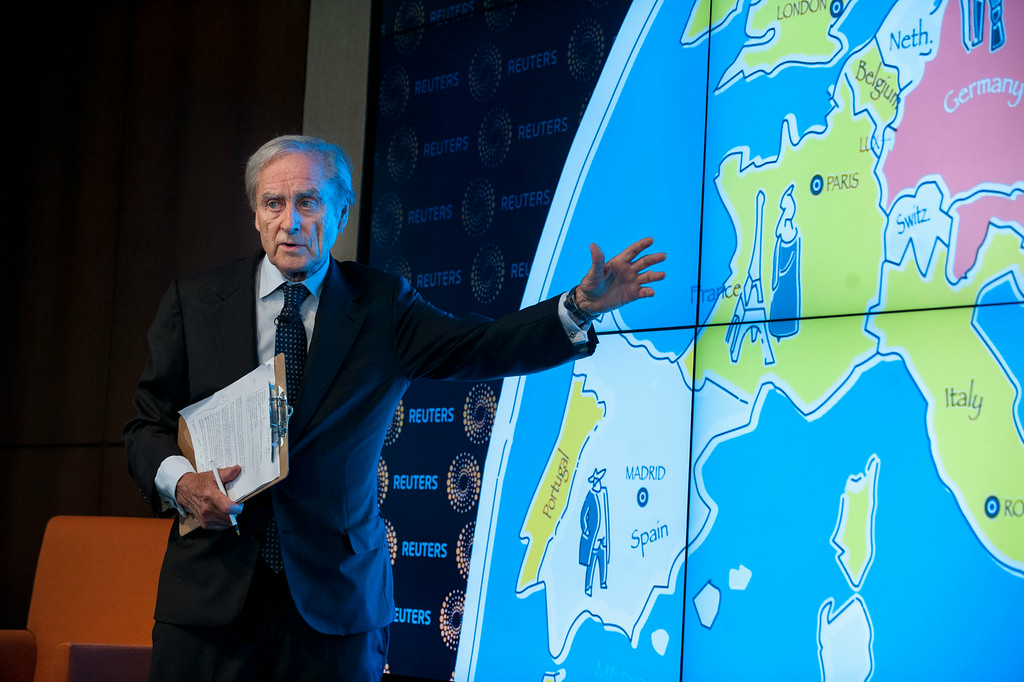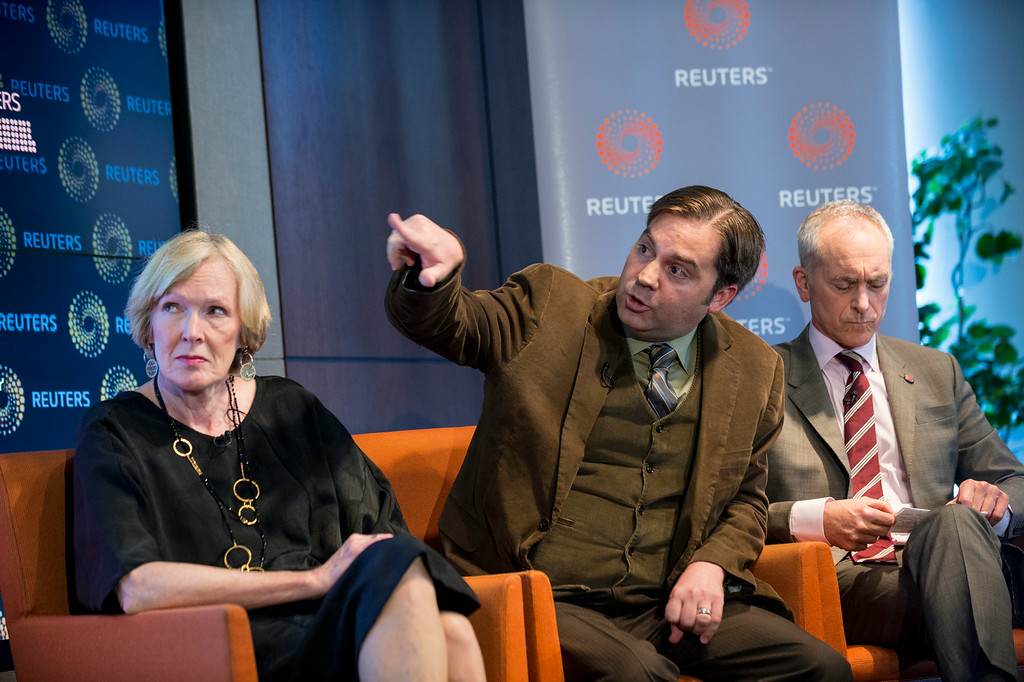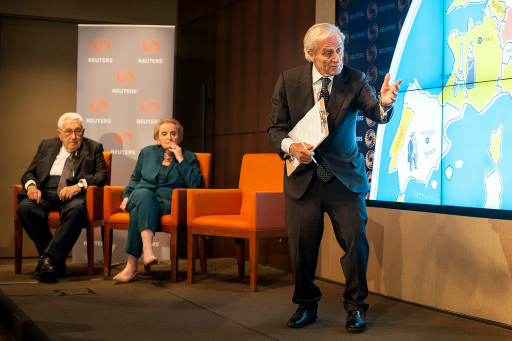Dr Jillian Davidson reports from a Reuters Newsmaker Event in New York, planned and moderated by Sir Harold Evans, and attended by former U.S Secretaries of State Dr Henry Kissinger and Dr Madeleine Albright.
The purpose of the evening was to examine the July 1914 crisis and to reflect upon the lessons of Sarajevo: “Why did a small number of European statesman take the world into the seminal catastrophe of the Great War?
The century since the end of the Napoleonic wars had been ‘the most peaceful Europe had ever known since the fall of the Roman Empire’ (Margaret MacMillan). The German Chancellor Otto von Bismarck had warned in 1880 that ‘some damned foolish thing in the Balkans’ might lead to a terrible war. The shots at Sarajevo did just that a hundred years ago. What have we learned?”
Reuters and World War One
CEO and President of Thomson Reuters, Jim Smith, launched the evening, setting the prevailing tone of excitement and intimacy. “We’ve been looking forward to this for a long time, though not quite as long as Harry [Sir Harold Evans] has been thinking about it!” Sir Harold had been planning the event for at least six months, and no doubt thinking about it for much longer. (By coincidence, his birthday is June 28.)
Mr. Smith asked the audience: “Where were you last Saturday morning [6/28/14]?” He continued, “In Sarajevo, one hundred years ago, it was a bright day, a Sunday as it so happens, but it changed the world: two shots that produced unknown billions of shots and, four years later, some twenty million people had died and the map of Europe had been redrawn with consequences that reverberate today.”
Jim Smith exclaimed that Reuters had been there on June 28, 1914. In fact, by WWI, Reuters had been delivering the news to the world for 63 years.
Their first main scoop was an earlier assassination, of President Lincoln in 1865, when Reuters’ journalists ingeniously used Irish fishing ships to intercept steamers and bring the news from the U.S. to Europe faster than the norm of twelve days.
In the Franco-Prussian War of 1870-1, besieging Paris, the Prussians cut off all cable traffic. Julius Reuter rose to that challenge and used carrier pigeons to carry news across the channel.
In the Reuters’ tradition of telling it straight, Jim Smith confessed: “We almost screwed up on June 28 1914.” London was agog, waiting for the results of the Grand Prix horse race in Paris.
A young editor, hearing the news, began to type out the results of the race: 1. Sarajevo; 2. Ferdinand; 3. Assassiné. Fortunately, “an alert editor stopped the transmission before we were forever embarrassed.”
Mr Smith announced that the Reuters staff from the Paris bureau had recently rediscovered some powerful photographs from the French battlefield, assumed lost for decades. Reuters, the Imperial War Museum and AMC theaters incorporated some of these photos in a short film co-production, presented to the gathering, of Wilfred Owen’s poem “Anthem for doomed youth,” narrated by Stephen Fry.
“An extraordinary panel”
Sir Harold was excited to introduce his distinguished guests. On his right, sat two illustrious politicians, Dr Henry Kissinger, U.S. Secretary of State 1973-77, Nobel Prize Winner and author of Diplomacy and Dr Madeleine Albright, U.S. Secretary of State, 1997-2001, and author of Madame Secretary. Sitting to his left were three renowned academics: Margaret MacMillan, Oxford Professor and author of The War to End Wars, Sean McMeekin, Professor of Koç University, Istanbul, and author of July 1914: Countdown to War and Scott Berg, winner of the National Book Award and Pulitzer Prize for his biography, Wilson.

Sir Harold Evans with a map of Europe (Courtesy Keith Bedford)
At the centre of the stage, there loomed the map of Europe, perhaps the main, passive (ergo tragic) protagonist of the night’s drama. The map was a representation of how Europe was divided after the shots at Sarajevo.
Readers of Harold Evans’ review “On the Brink” (of The Sleepwalkers. How Europe Went to War in 1914 by Christopher Clark and July 1914. Countdown to War by Sean McMeekin) may recall the presence of a very similar map on the front page of The NY Times Sunday Book Review, May 12, 2013.
Each member of the panel brought a level of experience and expertise related to a different geographic area on the map and a personal connection to Sarajevo. Sean McMeekin, having flown in from Istanbul, brought, in the words of Evans, “a whiff of the Ottoman Empire into these discussions.”
McMeekin retold the events of June 28th 1914 from the moment Franz Ferdinand left his hotel room to the moment when the archduke’s driver, having taken a wrong turn, put his car into reverse. Since the gearbox was a little bit clunky, the car sat motionless for about six seconds, allowing Gavrilo Princip to fire his two fatal shots.
Margaret MacMillan had been in Sarajevo for the anniversary weekend, but confessed that she was a bit of a persona non grata in Sarajevo for calling Princip a terrorist. Madeleine Albright had also been in Sarajevo, but during the Bosnian war. She recalled seeing pieces of documents from the Ottoman administration disintegrating in the air – the records of a whole era in history disappearing in flames.
Question no. 1: “Was this terrible war avoidable?”
Sir Harold’s first urgent question prompted an immediate unanimity:
Albright: I always believe that every war is avoidable.
Kissinger: Yes, avoidable.
MacMillan: I agree.
McMeekin: Entirely avoidable.
Berg: Well, I think avoidable.
Evans: What about the audience?
Audience: “Yes!”
Historic background
In order to fathom how Sarajevo led to World War One, Harold Evans called upon Dr. Kissinger to provide the historic background. “Didn’t the seeds for war lie deeper than Sarajevo? Wouldn’t you trace it back to when Otto Bismarck reunited Germany? Give me a picture for this audience of what was simmering beneath the surface of this map of Europe?”
Once offered the floor, Dr Kissinger seized the opportunity to modify his answer that World War One was avoidable. It was, he qualified, structurally unavoidable because of the system of alliances and because the war plans were tied to mobilisation schedules……”Any trivial event, as long as it could trigger an alliance, was likely to produce a general war.”
Dr Kissinger quoted his hero, Benjamin Disraeli. The unification of Germany was, according to British parliamentary Leader of the Opposition in 1871, a greater political revolution than the French Revolution.
It completely changed the balance of power in Central Europe. The potential of a unified Germany to defeat its neighbours individually convinced them to form alliances. The alliances in turn convinced Germany to make military plans in which they had, from the start, to defeat one of the allies. When war began in the Balkans and Russia mobilised, Germany had to defeat Russia’s ally before Russia fully mobilised. That explains why they attacked France, which as Kissinger emphasised, “was not part of that crisis.”
Harold Evans probed further. He asked whether the military bore the brunt of the responsibility for planning the war while the politicians proved too weak to prevent it. Dr. Kissinger commented that in most countries, even in Germany, the politicians did not comprehend the consequences of the military plans and especially how quickly the effect of the alliances would materialise. “The irony was that Austria, which triggered all of this with the ultimatum, was the last to go to war because their plans were more leisurely.”

Margaret MacMillan, Sean McMeekin and Scott Berg (Courtesy Keith Bedford)
Sean McMeekin interrupted to show that this map illustrated the narrative fallacy, masking a number of anomalies. For example, Italy had been an ally of Germany and Austro-Hungary since 1882, forming the Triple Alliance.
Romania entered a defensive alliance with Germany back in 1883. McMeekin pointed out that had the Germans played their own diplomatic cards better, refraining from declaring war first on France and Russia, Romania and Italy would have been bound to fight alongside Germany. “Which shows as important as alliances were, the decisions were finally up to the individual statesmen.”
The question of “Who pulled the strings?”
At this juncture, Harold Evans jumped in to discuss the importance of personalities and the question of who actually was running each country. Turning to his Secretaries of State, he quipped, provoking audience laughter, that sometimes statesmen have more power than politicians. More seriously, he quoted the opinion of the Grand Forks Herald in North Dakota one hundred years ago, “To the world, or to a nation, an archduke more or less makes little difference.”
Sir Harold then posed the question to Dr Kissinger about the Kaiser’s personality. “Was he an interfering fool, Henry, who made things worse? Be frank!” This induced laughter and a side comment from Madeleine Albright: “Henry’s not known for that!”
Dr Kissinger depicted the Kaiser as an extremely emotional and erratic character, but largely absent. Since he was lazy and always travelling, it was the bureaucracy that ran the country. Not yet satisfied, Evans pushed him further: “Answer the question! How powerful was he when this assassination happened and Vienna sent Hoyos to Berlin to get Germany’s support. What was the Kaiser’s role in that?”
Dr Kissinger explained that the Kaiser sought to use the situation to settle with Serbia. “I am reasonably convinced that it never occurred to him that this would lead to a general European War.” The Kaiser assumed the Austrians would punish Serbia. He was not interested in how and so went on a cruise to Norway.
The blank check, which he gave Austria, was for a war against Serbia, not a general war. As Margaret MacMillan pointed out, the risk and miscalculation was that Austria would act straight away and that Russia would not defend Serbia. The Austrians infuriated the Germans by delaying.
Tsar
And what about the Tsar, asked Harold Evans. Was he similar? Was he a very weak man? Dr McMeekin suggested that the Kaiser put it best when he described his first cousin as most suited to be a countryman growing turnips.
The intense Willy-Nicky correspondence of July 29-30 practically resembled instant telecommunications. On July 30, the Tsar gives the first order for mobilisation, but upon receiving a cable from his cousin, he rescinded the order; at this point he refused to “preside over this monstrous slaughter.”
Referring back to the map, Margaret MacMillan judged that it was a real failure of the Russian and German civilian leadership that both were bound to military plans that did not allow for mobilisation on one front. “The curious and tragic aspect of July 1914,” added Dr Kissinger, “was that it was the sort of crisis that had been settled for ten years, but this time someone mobilised.”
The American Question
At the time of Sarajevo, President Wilson was in the White House fully preoccupied with his wife of twenty-nine years, who was dying of Bright’s disease. America pursued a policy of neutrality. “What were they waiting for, twiddling their thumbs back in the U.S.?” begged Harold Evans.
It took a lot, Scott Berg dramatised, for the Americans to get there, to reach the point where Wilson on April 2nd 1917 uttered his immortal line: “The world must be made safe for democracy.”
Berg added: “Whatever country you want to name – Iraq, Syria, Mexico – wherever you want to go in the last century goes back to that sentence.” Perhaps, it was conjectured, had Teddy Roosevelt, who thought in terms of a global balance of power, ran as an independent in 1912, he would have tried to achieve peace in July of 1914.
The key question every historian hates to be asked: who was responsible?
Sir Harold warned the audience to watch everyone on the panel wriggle as they considered who was to blame. Relishing the prospect, he chose a path which began with Scott Berg and which gave Dr Kissinger the last word. “I just want degrees of responsibility. Who is 100% responsible, 50 or 10? Who would you put at the top of a gradated list of responsibility? We are very intrigued to know what you think!” So much so, that here follows a barely edited transcript of their discussion:
Berg: Germany, man. (Laughter)
Evans: You say Germany.
Berg: From Wilson’s standpoint and from the way I looked at it writing his life, it was Germany that had a number of opportunities that Wilson gave them, that indeed the world gave them. I’m intrigued by the fact that Germany wasn’t interested in going to the Hague tribunal, missing that telegram or not responding. I’m intrigued by a young soldier in the German army who then wrote a book called Mein Kampf and who said this wasn’t really about giving Austria Serbian satisfaction; it was really about Germany finding its place.
Evans: Good. That’s a clear statement.
McMeekin: Well, I’m not sure I would cite Hitler as an authority on the subject. In my own view, you have to take things in sequence. You have to start with Austro-Hungary and Serbia and they both have great responsibility for the snowballing of the conflict towards a localised war and possible European war. I would then move on to Russia and France because I think Russia and France, once it had reached crisis proportions, the statesmen had vested interests to continentalise the conflict into war. That is, they wanted a European war in which Britain would fight [articulated very deliberately]. It was actually the goal of the statesmen in Paris and St. Petersburg. The German statesmen, I think, were ultimately trapped by their own incompetence and by the incompetence of their allies into a war they did not fundamentally want, which is not to say they don’t bear a serious share of the blame.
Evans: So we’ve got Germany, Russia and France. Margaret?
MacMillan: Canada! (Heavy laughter)
Evans: What?
MacMillan: Well it’s about the only country, which hasn’t been blamed. As a Canadian, I have a bit of a nationalist interest in this. It really depends on what period you are talking about. If you are looking at the 28th of June, I would say it was Austro-Hungary’s fault… Look, Austro-Hungary had already lost an Empress through assassination, a number of governors through assassination. It was what Austro-Hungary decided to do with the assassination, which started the chain of events. But I think if you want to go back further, then you have to look at Britain’s refusal to share the colonial empire with Germany… I just think the First World War is so complicated and so complex that to try to pick out one responsible person, agent or factor is impossible. So I’m dodging the question.
Evans: … I want to give Madeleine a chance now. Who are you going to pin the blame on?
Albright: I actually would divide Austro-Hungary and put the blame on Budapest more than Vienna because I think they ran their part of the Empire having created some of this dissidence… and then Germany for taking advantage of it but they are all responsible in some way… The hardest part is to pin exact blame because there are so many aspects to it.
Evans: That’s what makes it so fascinating. Dr. Kissinger, this is going to be quite a weighty pronouncement so take your time. (Laughter)
Kissinger: I agree with Margaret. It is very difficult. It depends what period you are talking about. If July, then Austria and at the end Russia with its mobilization. If you talk about the ten years before 1914, I would say Germany by a very challenging foreign policy… So Germany contributed to this atmosphere of crisis in the ten years before the war, before July more than during the July crisis.
Evans: Ah, some commonality of agreement here about Germany’s significant role!
Kissinger: Yes!
The lessons of Sarajevo
Sir Harold asked his panel to consider how the lessons of July 1914 “apply to what the hell is going on today.”
Madeleine Albright eagerly explained that July 1914 demonstrates how countries acted when driven by fear of losing allies. Sarajevo shows how accidents play a larger part in history than we suppose. More significantly, the war was the result of wrong decisions made by leaders, based on facts that they misunderstood.
Albright drew a parallel between the July crisis and 9/11 regarding the issue of misread intelligence. She drew lessons in how politicians see things, how they see the role of their country.
Henry Kissinger agreed. “The chief lesson we have to learn is that you have to ask the consequences that are down the road and not just the crisis you are trying to manage.”
From personal experience, Madeleine Albright learnt that decisions are incremental. Incremental steps add up to something that you haven’t thought out through to the end. “I happen to think that the war in Iraq is one of the greatest mistakes made and it was based on faulty reading of intelligence and also using an event to do something else. So I have no views other than that.” The audience applauded.
The last words must, however, belong to the evening’s author, Harold Evans. The end of the war, he reminded everyone very soberly, was a bigger disaster than its beginnings. The war bequeathed the world Adolf Hitler and laid the seeds for World War II. More than 25,000 books have been written about World War One and the centenary will see many more. The books written by his panel, Sir Harold said, “happen to be distinguished by being particularly brilliant.”
The same could be said of the panel’s discussion that evening.
Posted by Mike Swain, Centenary News
© Dr Jillian Davidson and Centenary Digital Ltd
